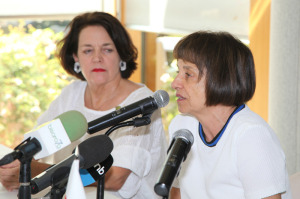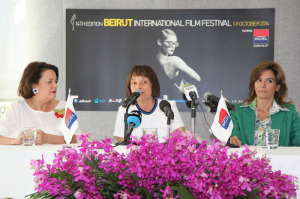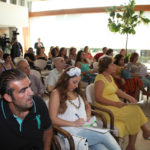BIFF Press Conference Roundup

Festival Director Colette Naufal held a press conference at downtown Beirut’s Le Gray Hotel on Wednesday, stressing that “the growing reputation of the festival” allowed it to win the premiere screening in the Middle East and the United States of Cloud of Sils Maria, one of the main contenders for the Golden Palm at the 2014 edition of the Cannes Film Festival.
BIFF President Alice Eddé and Société Générale Bank representative Noha Abou Saad also took part in the press conference during which Naufal explained that the 78 films on the festival agenda are divided over Middle East Film Competition, and 6 other sections. This year’s edition features the return of the Middle Eastern Feature Film category after a two-year absence, in addition to the Middle Eastern Short Film and the Middle Eastern Documentary. Other categories are the international Panorama, the “Rejection Front” with its two subcategories – the “Public Square” and the “Culinary and Ecology Movies” – in addition to a retrospective on Italian Director Roberto Rossellini, and Spotlight on the works of Irish director and film critic Mark Cousins.

Naufal said that the jury shall be presided by French actress and producer Julie Gayet. Jury members are: Alesia Weston (the former head of the Sundance/NHK International Filmmakers Award and Mahindra International Filmmakers Awards for the launch of emerging talents, as well as the international work of the Institute Feature Film Labs in Utah); Protagonist Pictures CEO Mike Goodridge; 67-year-old Iranian actor Homayoun Ershadi (who plays a role in A Most Wanted Man); and Lebanese media figure, screenwriter and script doctor Joelle Touma.

The 14th edition of BIFF shall feature “more than 70 film professionals, including directors, actors, producers, marketing figures and top critics from the Middle East, Europe and the United States.” Many stars shall attend the opening film and be present throughout the festival.
Naufal went on saying that the opening film shall be attended by Assayas, Binoche, Gayet and jury members, in addition to Siddharth director Richie Mehta, Iranian director of Fifi Howls from Happiness Mitra Farahani, US-Palestinian director of May in the Summer Cherien Dabis, Wild Bunch film distribution company co-founder Vincent Maraval, screenwriter and producer Timothy Grayson, Cambodian-born British director of Lilting Hong Khaou, and Lebanese director Ziad Doueiri.
Other guests in attendance include Natural Resistance director Jonathan Nossiter, Santiago Amigorena, the director of Les Enfants Rouges, Garance Mazureck, who played the main role in the same movie, and others.
The festival allows regional producers and directors to express themselves freely and without any constraints. – Colette Naufal, Festival’s Director
The 2014 edition promotes the familiar formula of the festival, but at the same time its concept is reformulated as it now focuses increasingly on three axes, namely freedom of expression, human rights and the environment. The 2014 edition also offers a rich array of high-level movies, which featured in international festivals and won or contended for prizes. We allow the Lebanese public to watch these magnificent works, most of which are not screened in commercial theatres. – Colette Naufal, Festival’s Director
Key facts
The 2014 edition of the Beirut International Film Festival features 78 movies from October 1 to October 9 with Assayas, Binoche, and jury president Julie Gayet as main guests.
Opening film: Sils Maria
Closing film: A Most Wanted Man
The 14th edition of the Beirut International Film Festival (BIFF) will open on October 1 at Abraj theaters in Furn el Shebbak with Clouds of Sils Maria, by French director Olivier Assayas, starring Juliette Binoche, Kristen Stewart and Chloé Grace Moretz. The festival will close on October 9 with A Most Wanted Man, by Anton Corbijn, starring the late Philip Seymour Hoffman, Rachel McAdams, Homayoun Ershadi, Robin Wright and Grigoriy Dobrygin.
Selection: The international Panorama
The international Panorama category comprises 25 films, including opening film Clouds of Sils Maria and A Most Wanted Man, featuring Iranian jury member Homayoun Ershadi, in addition to The President by Iranian director Mohsen Makhmalbaf. This movie, which was the opening of the latest Venice Festival, is inspired by Arab Spring revolutions and tells the story of a dictator who runs away after a coup with his five-year-old grandson. The runaway dictator disguises as a street musician. He thus comes into contact with his people, gets to know them from a different point of view and realizes the injustice he has inflicted on them. The last scene of the movie is remniscient of the end of late Libyan leader Muammar Gaddafi knowing that Makhmalbaf shot his film in Georgia.
Transit Game is a short film by Iranian-bon US director Anna Fahr, starring Sajed Amer, Jalal Altawil and Rachad Salloum. It is also inspired by Arab Spring revolutions, specifically the war in Syria.
Fifi Howls from Happiness is a documentary by another Iranian director, Mitra Farahani, who relates the story of Iranian painter and sculptor Bahman Mohassess, the so-called “Persian Picasso”.
Also tackling “banned art” in Iran is Desert Dancer, by British director Ricahrd Raymond who tells the story of Afshin Ghaffarian. The film is produced by Saudi film producer Mohammed Al-Turki.
The Panorama documentary category comprises The Devil’s Violinist, which chronicles the life of another artist, namely renowed Italian violinist Niccolò Paganini.
Under the same category, Cinéast(e)s is a documentary by Jury President July Gayet, starring Mathieu Busson, in which several female filmmakers talk about the issues encountered by women in making films and the scarcity of female directors.
The Unknown Known, by US director Errol Morris, is a political documentary in which former United States Secretary of Defense, Donald Rumsfeld, discusses his career, the highlight of whih was his planning the US invasion of Iraq in 2003.
Furthermore, the Panorama agenda features films that tackle social issues in the Arab world, such as When Monalisa Smiled, by Jordanian director Fadi Haddad, in which he tells the story of a Jordanian girl who never smiles and who falls in love with an Egyptian young man and seeks her autonomy and freedom from social pressure in order to achieve her dreams. Cherien Dabis, a US director born to a Palestinian father and a Jordanian mother, is the director and main actress in May in the Summer, starring Hiam Abbass, Alia Shawkat and Nadine Malouf, which tells the story of a Christian Palestinian young woman who lives in the United States and comes back to Amman to marry a Muslim young man despite her mother’s opposition.
One of the special films under Panorama is Tom à la Ferme, by 25-year-old Canadian director Xavier Dolan, who was the youngest director to take part in the Cannes Film Festival this year. The film, in which Dolan is the leading actor alongside Pierre-Yves Cardinal, tackled homosexuality, won the FIPRESCI Prize at the 2013 Venice Film Festival and was slated for winning the Golden Lion. It competed for awards in several festivals, including the Canadian Screen Awards Festival and the Toronto Film Festival.
Homosexuality is the subject of Love Is Strange, by US director Ira Sachs, starring John Lithgow and Alfred Molina.
The Panorama category allows the Beirut International Film Festival to open up new prospects, reaching Africa with Des Étoiles, by Senegalese director Dyana Gaye. The film, which addresses African migration in search of work opportunities and a decent life, won the jury award at the Festival Premiers Plans d’Angers in France and competed for prizes at the Dubai and Santa Barbara film festivals.
Lilting, by Cambodian-born British director Hong Khaou, won an award at the Sundance Film Festival. It tackles another aspect of migration, namely cultural alienation, as it relates the story of a Chinese widow who lives in Great Britain and does not speak any English.
Siddharth is another Asian film by Indian-born Canadian director Richie Mehta. It chronicles a father’s journey across India in search of his 12-year-old son, whom he fears has been kidnapped by child-trafficking gangs.
South America also has a share in Panorama with The Man of the Crowd (O Homem das Multidões in Portuguese) by Brazilian director Marcelo Gomes, which was screened under the Panorama category at the 64th Berlin International Film Festival.
Panorama films also include Calvary, by Irish director John Michael McDonagh, starring Brendan Gleeson and Kelly Reilly. Crazy Love, by Austrian director Jessica Hausner, ran in the “Un Certain Regard” section at the Cannes Film Festival. Party Girl won two prizes at the Cannes Film Festival, including the Golden Camera Award. La Chambre Bleue, by Mathieu Amarlic, was also slated for winning the “Un Certain Regard” prize at the Cannes Film Festival. This movie features Amalric himself in the leading role alongside his wife, actress Stéphanie Cléau. Other films include Bird People, by Pascale Ferran, and L’Homme qu’On Aimait Trop, by André Téchiné who resumes directing after a long absence. The film stars Catherine Deneuve, Adèle Haenel and Guillaume Canet.
The Panorama category features, as well, Queen & Country, by British director John Boorman, and Night Moves, by US director Kelly Reichardt, starring Jesse Eisenberg, Dakota Fanning and Peter Sarsgaard. This movie won the Grand Special Prize at the 2013 Deauville Film Festival and Best DOP at the Valladolid International Film Festival, and was slated for winning the Golden Lion at the Venice Film Festival. The category also comprises Les Enfants Rouges by Santiago Amigorena.
Selection: Feature Films
After a two-year absence, the Middle Eastern Feature Film category returns this year with 4 films by directors from Tunisia, Algeria, Palestine and Iran. One of the main contenders for the ALEPH award for best Middle Eastern Feature Film is Bastardo, by Tunisian director Nejib Beldakhi, that won the Grand Prix for best Feature Film during the 20th edition of the International Festival of Mediterranean Film in Tetouan, in addition to the best Feature Film in the African, Asian and Latin America Film Festival in Milano.
Another contender for the ALEPH award for best Middle Eastern Feature Film is Giraffada, the first Feature Film of Rani Massalha, a Palestinian director living in France.
La Preuve by Algerian director Amor Hakkar is contending as well for the same award. The film stars Nabil Asli, a young actor who won the best Male Performance award in the Feature Film category at Algeria’s Maghreb Film Festival, for his role in the film.
This category features as well the Kurdish-language film The last winter (Zemestan Akhar) by Iranian director Salem Salavati. This film already won the Jury Special Award at Baghdad Film Festival, the FIPRESCI Award at the Yerevan Golden Apricot International Film Festival (Armenia), the Best International Film Award at the First Erbil International Film Festival, in addition to the Best Director and Best Actress prizes at the Duhok International Film Festival in Iraq.
Selection: Documentary Films
The Middle Eastern Documentary competition features 7 films among which are 2 from Egypt and 1 film from each of Tunisia, Bahrain, Iran, Turkey and Syria. The ALEPH award will be granted for the Best Film in this category, Best Director in addition to the Jury Special Award.
Two Egyptian movies will compete under this section: the documentary All Around Alexandria by Faten El Bendarie and Mohamed Essam’s Portrait: Hassan El Shark, which was awarded the Jury Prize at the “Festival International du Film Transsaharien de Zagora”, Morocco, 2013.
The competition also includes Challat of Tunis by Kaouther Ben Hania and Hodgkin’s, a film by Bahraini director Mohammed Jassim, awarded best documentary and best director at the Accolade Film Festival in California.
Living with Leviathan, by Turkish director Şirin Bahar Demirel who won the Special Jury Award in the 22nd International ContraVision Film Festival in Berlin, and the PhoneDox Award in ZagrebDox International Documentary Film Festival (Croatia) is also taking part in this section.
Among the movies listed in this category is Syria Inside, directed by Tamer Alawam who was killed few months ago in Aleppo’s fights. His colleagues, including director Jan Heilig, finalized the documentary.
Selection: Short Films’ Competition
17 movies are competing in The Middle Eastern Short Films’ competition this year. Awards will be given to the first, second and third best movies in this category, in addition to the special jury award.
Among the movies listed in this category are five by Iranian directors, two of which are in Farsi: 17 years and a day by Nora Niasari (won the Gold Remi Award in the 47th WorldFest-Houston International Film Festival) and More Than Two Hours by Ali Asgari (Best Short Film in Indianapolis Film Festival, 2013, Best Director, Best Short Film, Barcelona DH Film Festival, 2013, and Grand Prix for Best Film, Busan International Short Film Festival, South Korea, 2014). The 3 others The Love of This Empty House by Omid Rastbin, Butterflies by Adnan Zandi and Ants Apartment by Tofigh Amani are in Kurdish.
Two Iraqi (Kurdish speaking) films are also competing in this category: The Day is Gone by Iraqi director Rzgar Husen and Slow Fall by Hussein Al Maliki.
3 films are from the GCC countries, out of which 2 are from Bahrain (Steps by Salman Yousif and A Very Private Place by Jamal Al Ghailan), and Adam’s Ant by Mohanna Abdullah, from Saudi Arabia.
Also listed in this category are Horizon by Jordanian director Zain Duraie, which won the Audience Choice Award in the Franco Arab Film Festival, Jordan, and participated in many international festivals; Izriqaq, by Palestinian director Rama Mari, who studied cinema in San Fransisco; and Kayfa Tarani by Egyptian director Soad Shawky (Best Short Film in Alexandria International Film Festival, 2013 and Best Short Film in Women Cinema Competition, Muscat International Film Festival, 2014).
Four movies from Lebanon are competing under this section as well: Le Miroir (French speaking) by French-Lebanese director Celine Kotaiche, and With Thy Spirit by Karim Rahbani, both produced by IESAV; in addition to My Apologies to Beirut by Antoine Fadel and Yalda by Rusha Faraj.
Selection: Rossellini Retrospective and a Spotlight on Mark Cousins
“Rossellini Retrospective” is a section dedicated to Italian director Roberto Rossellini (1906-1977). It features six of his movies: Germania anno Zero (1947), Paisà (1946), Roma città aperta (1945), Stromboli (1949), Viaggio in Italia (1954) and L’Amore (1948).
“Spotlight on Mark Cousins” is a section that will shed light on the filmography of Irish director and film critic Mark Cousins. Life May be, A Story of Children and Film and Here Be Dragons will be projected during the festival.
Selection: The “Rejection Front”
“The Rejection Front” is a new category, launched in this year’s edition of BIFF. It includes two subcategories: “the Public Square” and the “Culinary, Environment and Ecology” section.
Nine movies are listed in “the “Public Square” subcategory, four of which are Egyptian: Baheya by the director Mavie Maher, Helwan… Moi by Mohammed Adel, Masrya by Shady ElHakim and Virtual by Nada Riyadh, both awarded at the New Egypt Film Competition.
Lebanese films Beirut Hanan Beirut by Patrick Issa and Will you marry me? by Zuheir Kreidieh, produced by IESAV, are competing in this subcategory.
This section features Did you accept or not?, a Kurdish speaking movie by Iraqi director Soran Ebrahim, I want to live by Palestinian director Ahmad Tariq Hamad (Best Short Documentary in the Middle East Karama Film Festival, Jordan, 2012) and Syrian Wounds by German-Syrian director Husam Ayoub.
Selection: Culinary / Environment / Ecology
It features three movies: Energized by Austrian director Hubert Canaval , Food Chains produced by American star Eva Longoria and Résistance Naturelle, a documentary by American-Brazilian director Jonathan Nossiter.
Tickets
Tickets will be available as of September 24th, at Abraj theaters between 4 pm and 10 pm, for 6500 L.L.each for regular screenings.
Master Classes and Panels
Master classes and panels will be held with some of the filmmakers, incuding a panel with Olivier Assayas on October 2, at 11 am.
A debate with Résistance Naturelle’s director and famous winegrower Jonathan Nossiter will be organized, with the participation of Luca Gargano, a popular importer of wine in Italy, and Lebanese winegrowers.
Attendance is free of charge.
Festival Partners
During the press conference, Naufal extended special thanks to “SGBL – Société Générale de Banque au Liban” the permanent official partner of the Festival, and BIFF media partners, Future Television, TV5 Monde, LBCI, Nostalgie, Al Akhbar, and sponsors: Sursock Palace and LE Gray.
Mrs. Noha Abou Saad, Director of Strategy & Marketing at SGBL said: “As the patron of the BIFF, we confirm once again our commitment to cultural and artistic activities, stressing on their impact on social development”.
For info or clarification:
- Please call: Bassem El Hage + 961 3 724214
- Or email him: [email protected] / [email protected]

















